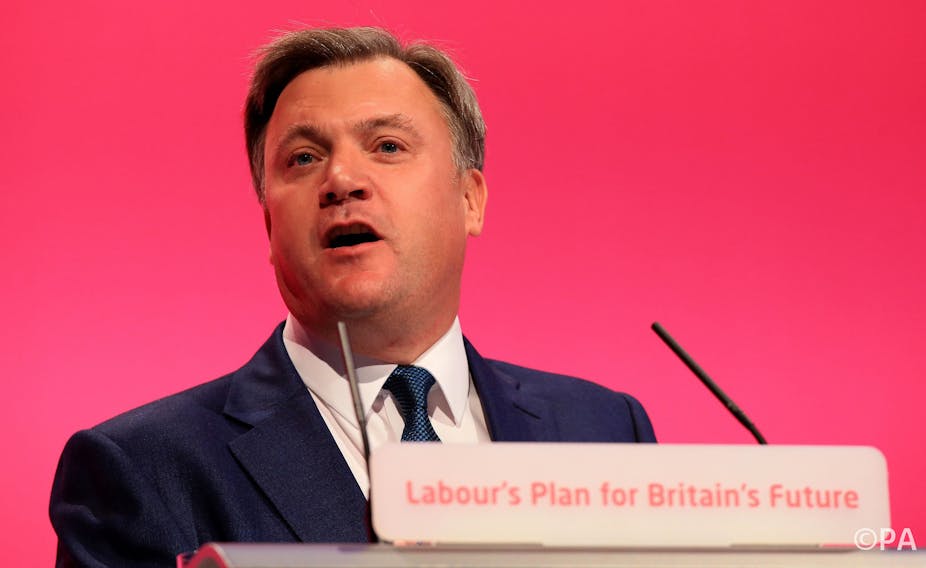Two noteworthy things happened in Milton Keynes on Monday morning. Ed Miliband chaired the first meeting of Labour’s English Regional Shadow Cabinet – comprising mainly leaders of councils and combined authorities. And, as a curtain-raiser, shadow Chancellor Ed Balls announced that, if Labour forms the next government, it will transfer £30 billion-worth of funding for housing, transport, business support, employment and skills training to England’s regions.
There would be fiscal devolution too, with combined authorities – the key players for any future government – able to retain any extra business rates generated by economic growth in their area.
If these initiatives were to materialise, they would indeed represent “the biggest devolution of economic power and funding for generations”, as Balls’s own blog claims. But this is a big “if”, for a party with an instinctively centralist leadership, already committed to eliminating the national deficit by 2020.
Game-changing policy, if it happens
For England’s existing and future Combined Authorities (CAs), Ed Balls’s announcement is a potential game-changer, and not just because of the £30 billion. There was also the promise that areas choosing not to have an elected mayor would not be “punished” economically by a Labour government, as they have been under the coalition.
Combined Authorities were created by Labour legislation in 2009, but all five to date have been established by Chancellor George Osborne.
They are set up at the request of authorities in a specified area, who have agreed a scheme for exercising devolved statutory functions, relating initially to transport investment and economic growth.
They’re still largely unfamiliar bodies, and it’s worth reviewing just what and where they are.
Manchester: a special case
First away in 2011 was the Greater Manchester CA (GMCA), thanks largely to the city region’s exceptional institutional history. The GMCA incorporates the 10 boroughs of the former Greater Manchester metropolitan county. Following the Thatcher government’s 1986 abolition of England’s six metropolitan county councils, the borough leaders formed the Association of Greater Manchester Authorities and continued to work collaboratively, to a much greater extent than in the other met county areas.

To coalition ministers, this continuity of cooperation and geographical coherence gave the GMCA a big advantage over other city regions, plus proven potential for robust governance.
There was, though, a further consideration: Labour’s control of eight of the ten boroughs and therefore of the GMCA itself. In brokering the historic “Devo Manc” deal in November 2014, therefore, Osborne insisted the extended package of devolved powers and funding must be matched by the leaders’ agreement, however reluctant, to a directly elected mayor.
Your fiscal freedom for a mayor
An elected mayor would give the now seriously powerful GMCA visibility, leadership, and, most importantly, accountability. But that it was a make-or-break requirement became clear only during the government’s next devolution deal, with the forever-Labour Sheffield City Region CA.
Sheffield’s agreed package was smaller than Greater Manchester’s. But in particular, it contained no fiscal devolution comparable to Manchester’s unique ‘Earnback’ deal, enabling the CA to retain additional tax revenues generated through infrastructure investment.
As William Hague, chair of the cabinet’s devolution committee, told a parliamentary reform group recently, Conservative ministers are extremely wary of devolving revenue-raising powers because of the “very, very fraught history” of local finance and some councils’ “lack of control” during presumably the pre-rate-capping 1980s.
So, 30 years on, Conservative ministers’ elephantine, Thatcherite memories have set the price of any worthwhile fiscal devolution as a directly elected mayor. Sheffield leaders didn’t want one. Fine, they could have some extra control over transport, skills, housing and business support, but nothing approaching a Devo Manc deal.
Still, they have got something. Their neighbours in the West Yorkshire CA thought they’d call Osborne’s bluff. They stuck to their bids for fiscal devolution – including full retention of the growth in business rates – hoping the Chancellor might overlook their opposition to an elected mayor. He didn’t, so they dropped the fiscal stuff, but two months on they’re still waiting for any kind of deal.
So too is the Liverpool City Region CA, which, even more misguidedly, proposed some “open talks” with Osborne about the possibility of a Manchester-type deal – which was never on – and without apparently the six borough councils agreeing even amongst themselves agreeing among themselves about an elected mayor.
Finally, there’s the North East CA. At present, any deal is barely at the prospectus stage, putting the North East marginally behind the other CAs, but comfortably ahead of the rest of the field.
Ed Balls’s Milton Keynes manifesto won’t change many votes, and most city regions are Labour-dominated anyway. It has, though, set the devolution policy bar at a measurable level against which a future Labour government will be judged, by supporters and critics alike.

